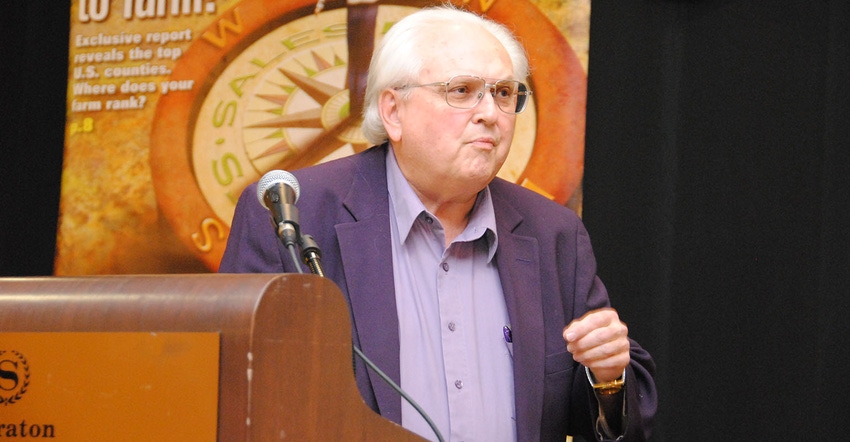
Editor’s note: Esteemed Kansas State University ag economist Barry Flinchbaugh passed away Nov. 2, 2020. This story originally ran online at FarmFutures.com in 2007.
Barry Flinchbaugh suffers no fools. The master of ‘tell it as he sees it,” the farm policy guru and Kansas State ag econ professor shares his insights on past farm policy, good and bad.
FF: Why do you suppose agriculture is the only industry that has a bill passed on its behalf every four or five years?
Flinchbaugh: First, people like farmers, and they understand it’s a tough occupation. There’s a lot of good will there and that’s important politically. Second, it’s food we’re talking about. I was asked one time why we subsidize farmers and not travel agents. I said, ‘We don’t need to go on vacation, but we do need to eat.’ It’s fundamental.
All the critics of farm programs that come out of the woodwork love the small farmer or the medium sized farmer; it’s the big farmer that they get after because they know that after we go through any transition, he doesn’t need these programs to survive.
Ironically, the group they love – small farms - is the group that has the most ability to survive elimination of farm programs. The medium sized farmer won’t survive if we get rid of farm programs; the small farmer will because he subsidizes his income with a job in town.
FF: You’ve been at the forefront of so many farm policy debates. What is your defining moment?
Flinchbaugh: For me it was the ’96 Freedom-to-Farm bill. It went through a Republican congress but was signed by a Democratic president. I hang my hat on the ‘96 bill because it gave us a direct payment that gave us a floor under farm income, a safety net with a minimal of market distortion. That’s the best of both worlds.
FF: Earl Butz was your mentor when you both taught at Purdue. What was he like to work with?
Flinchbaugh: Butz taught me how you blend economics and politics. What I really learned from Earl was how you take those economics and make them work politically. As a result, I never waste any time on things that have absolutely no chance politically.
If we had a revenue assurance proposal that eliminated the crop insurance industry, it would be a nonstarter, because the crop insurance industry has political power. Besides, crop insurance is valuable to farmers.
He was very partisan, but he always supported me being bipartisan. Earl decided he was going to be a politician rather than an educator. I’ve had opportunities to be a politician and I’ve always turned them down. I don’t have the mentality to be a politician. I love politics and policy, but I have a very low tolerance for fools, and I call it as I see it. You can’t do that politically. I will always err on the side of being politically incorrect.
FF: Were there ever any great farm policy ideas that just never went anywhere?
Flinchbaugh: The old Brannan plan in 1949 – he was Secretary of Ag under Truman. It was a direct, decoupled payment. Far ahead of its time, but it got nowhere. Ironically, he was president of the Rocky Mountain Farmers Union at one time, from Denver.
I have fun with my Farmers Union friends when they opposed Freedom-to-Farm, and I tell them it came out of their organization - just read your history. Truman made a speech one time in which he said we’ve got to put a floor under farm income. Harry understood it.
FF: What was the dumbest policy idea you ever heard?
Flinchbaugh: Parity was one. Parity does not measure the wealth of U.S. farmers, yet, we still have people believing in it. It’s by far the stupidest idea we ever came up with.
Now, there’s two kinds of parity – I’m talking about parity price, that index relationship between the price farmers receive compared to prices they pay. In other words, if so many bushels of corn would buy a tractor in a base period then, it should do so today.
We also talk about parity income – I don’t have any problem with that. That gets back to this floor; it means the average farmer should have parity income with the average family in town. That doesn’t bother me. I would argue they need more because they (farmers) are producing an essential commodity.
Related coverage:
Flinchbaugh memories bring shared smiles
Kansas State mourns loss of esteemed agricultural economics professor
About the Author(s)
You May Also Like






